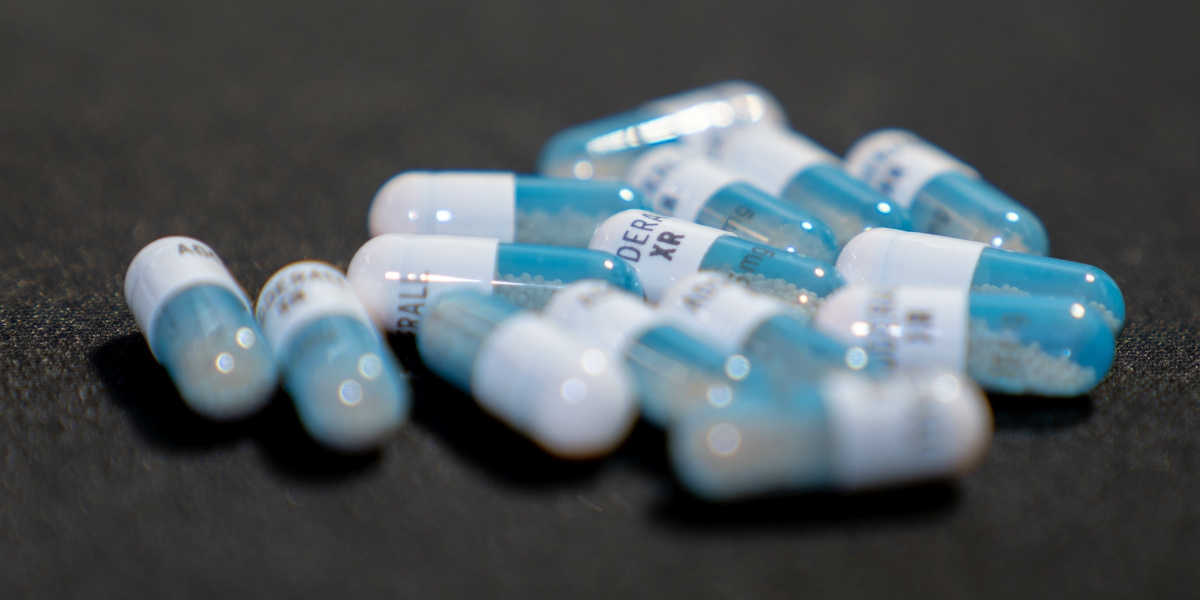Adderall Tolerance

Adderall, a prescription medication for treating attention deficit hyperactivity disorder (ADHD), can cause tolerance and reduced effectiveness over time.
Developing a stimulant tolerance to drugs like Adderall, an amphetamine, is a concern for people abusing prescription drugs because they must take higher or more frequent doses to feel the effects, increasing the risk of health complications and Adderall addiction.
Can You Build Up a Tolerance to Adderall?
Yes, your body can build up a tolerance to Adderall. Developing a tolerance is very common for people taking stimulant medication as prescribed for medical purposes and those abusing it.
Prescription stimulants like Adderall interact with neurotransmitters in the brain to affect and alter chemical release. With consistent exposure, the brain adjusts its natural chemical production to accommodate the presence of Adderall. Eventually, the initial dose doesn’t have the same effects because the brain has developed tolerance.
Tolerance develops at a different rate for everyone, based on several factors. Factors that influence developing a tolerance include:
- Regular dose amount
- Length and frequency of use
- Genetic makeup
- Personal history of substance abuse
- Other medicine, supplements, or drugs regularly taken
People taking ADHD medication under medical supervision who develop tolerance should seek medical advice as their doctor may want to explore other options and medications before increasing the dose. While developing tolerance is sometimes unavoidable, most doctors want to avoid the progression of tolerance, dependence, and addiction.
People without ADHD who abuse their doses of Adderall and build up a tolerance will frequently solve the problem by taking higher doses, mixing it with other drugs or alcohol, snorting Adderall, or smoking it to feel the effects faster and more intensely.
Interestingly, one study showed that increased Adderall tolerance also caused an increased tolerance to cocaine.
Mixing Adderall with alcohol or snorting extended-release tablets have additional dangers, including rapidly increasing tolerance. When someone engages in these behaviors, they most likely have an addiction or substance use disorder.
Can Adderall Stop Working?
Adderall can stop working because you no longer feel the effects, or it stops helping manage ADHD symptoms. The medication itself still interacts with the neurotransmitters in the brain. Still, once there is a solid Adderall or amphetamine tolerance, the feeling of the drug stops being effective to the person taking it.
People who abused Adderall often say that it stopped working when what they mean is that they weren’t getting the desired high they wanted. As previously mentioned, this is when the abuse escalates in dangerous ways that can lead to Adderall addiction and potentially amphetamine toxicity or an Adderall overdose.
Adderall Resistance
Although rare, some people naturally resist Adderall and other prescription stimulants. Resistance means that, for whatever reason, the neurotransmitters in the brain and body are immune to the effects of Adderall. Most researchers attribute genetic resistance to a gene or enzyme mutation that prevents the body from processing or reacting to some medications.
Medication resistance exists on a scale, so some patients may require a higher dose of Adderall to be effective, and some may not react to any amount. When a person is completely Adderall resistant, doctors can try other non-stimulant ADHD medications like Strattera.

How to Reduce Adderall Tolerance
Of course, it is better to prevent Adderall tolerance in the first place, but it is possible to reduce tolerance in people who already have it.
The best way to reverse or reduce amphetamine tolerance is by slowly lowering your intake or tapering. It is imperative to seek medical advice before quitting any drug. Quitting cold turkey can cause unpleasant side effects, withdrawal symptoms, and a re-emergence of ADHD symptoms.
Depending on the tolerance level, some doctors may recommend a short break or what internet users call a 3-day Adderall break, meant for people with low tolerance to see how they function and feel without the drug.
Once you establish that baseline with your doctor, you can reassess your need for Adderall and the doses you are taking. “Adderall holidays” are not for people that have taken Adderall for a long time.
Like everyone develops Adderall tolerance at different rates, reducing tolerance will happen to everyone differently. Ultimately, the only way to reduce Adderall tolerance is time and abstinence.
People with reduced tolerance to Adderall who start retaking large amounts put themselves at risk for an accidental overdose, as their bodies can’t handle it like they once did.
Adderall Tolerance Reset
If you avoid taking the drug long enough, your Adderall tolerance might reset; however, it is unlikely that you will ever reach the way you were before you took it until years after your last dose.
Despite some places marketing Adderall tolerance reset supplements or cures, there is no realistic way to reset your tolerance. Furthermore, taking unknown and untested supplements can cause dangerous side effects, drug interactions, and unpleasant withdrawal symptoms.
If you want to reset your tolerance because Adderall isn’t helping your ADHD any longer, speak with your doctor about alternate treatment approaches. If you are trying to reset your Adderall tolerance so you can get high from it the way you used to enjoy, you should look into your addiction treatment options, as more significant issues are at play.
Furthermore, a cycle of quitting a drug and going through withdrawal only to resume using it increases your chances of developing protracted withdrawal syndrome (PWS) when you finally stop for good.
Adderall Withdrawal Symptoms
Adderall withdrawal symptoms will vary for everyone based on the length and severity of the use or addiction, but they include difficult and sometimes dangerous physical and mental symptoms.
Withdrawal symptoms from Adderall include:
- Headache
- Restlessness
- Drug cravings
- Fatigue
- Anxiety
- Depression
- Excessive sleeping
- Sweating
- Difficulty focusing
- Memory challenges
- Changes in heart rate and blood pressure
- Seizures
Always seek medical advice before you stop taking Adderall to ensure your safety and learn what to expect. Some people may require a supervised medical detox to have medical professionals monitor and manage the withdrawal symptoms.

Adderall Abuse Help and Adderall Addiction Treatment
If you or a loved one are struggling with Adderall abuse or any stimulant drug abuse and addiction, compassionate and immediate help is available.
At Northridge Addiction Treatment Center, we take a whole-person, holistic treatment approach to help you overcome addiction, blossom into your full potential, and achieve lasting recovery.
We offer onsite medical detox to get you safely through withdrawal, surrounded by medical care and support. The tranquil and revitalizing beauty of Los Angeles’ San Fernando Valley surrounds our residential treatment center, providing the peace you need to focus on recovery and learning new and healthy ways to live through evidence-based therapies.
Reach out to our treatment experts today to begin your path to recovery; we are eager to speak with you.
Find Meaningful Recovery
Our caring and compassionate specialists are eager to help you comfortably navigate this journey to recovery. Our individualized treatment plan, programs, and therapies may be a perfect match for you or your loved one. Let us assist you in living the happy life you deserve. It starts with a phone call.




